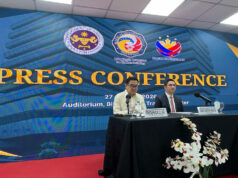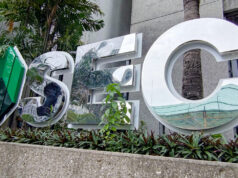Bourse retreats further on inflation, trade war fears
THE MAIN INDEX marked its second day of decline on Friday as investors continued to reel from a faster-than-estimated June inflation that was reported on Thursday morning, becoming the odd-man out among largely positive Asian markets.
Analysts also noted that the local market dove for cover as US tariffs on $34 billion worth of Chinese imports took effect, triggering a full-blown trade war between the world’s two biggest economies, even as this development had already been priced in by many foreign counterparts.
The Philippine Stock Exchange index (PSEi) gave up 46.86 points or 0.64% to close 7,186.71 — 0.097% down on the week from June 29’s 7,193.68 finish — while the all-shares index dropped 20.28 points or 0.46 points to end 4,387.34.
Friday marked the second straight day of net foreign selling and saw four of the six sectoral indices end lower.
FEARS BITE
RCBC Securities, Inc. noted in its Stock Market Weekend Recap on Friday that “Philippine equities remained downbeat… following the release yesterday of higher-than-expected June inflation of 5.2%” — a fresh five-year peak that sustained an ascent for six straight months and marked the fourth straight month that overall price hikes pierced the Bangko Sentral ng Pilipinas’ (BSP) 2-4% full-year 2018 target range. June inflation pierced the 4.3-5.1% range estimated by the BSP’s Department of Economic Research for that month, the 4.9% estimate of the Department of Finance and the 4.7% median of BusinessWorld’s poll of private sector economists.
June inflation took last semester’s pace to 4.3%, a bit higher than the BSP’s full-year target range though still below a downgraded 4.5% forecast average for 2018.
Luis A. Limlingan, managing director of Regina Capital Developmemt Corp., noted in a mobile phone message that “Philippine markets got off to a rocky start before a bit of a recovery softened the impact, as investors now grapple with how a possible rate hike of even 50 bps would affect inflation as well as borrowing and lending.”
The BSP’s Monetary Board raised policy interest rates by 25 basis points each on May 10 and June 20 for the first time in nearly four years, but several economists agree that June’s faster-than-expected inflation — described by BSP Governor Nestor A. Espenilla, Jr. as “a setback” and by Socioeconomic Planning Secretary Ernesto M. Pernia as “unwelcome” — left at least another rate hike on the cards this year.
Mr. Limlingan noted “[a]lso the mood was bearish with US-China trade tensions… kicking off as President Trump confirms tariffs to be implemented”, while Jervin S. De Celis, equities trader at Timson Securities, Inc., said in a separate text message that “[t]he PSEi went down… as the US Tariffs on Chinese goods take effect today”.
“However, the market’s reception of the news is a bit warmer than expected. The market may have priced in this news since the trade rift started a few weeks ago,” Mr. De Celis said.
Reuters reported that Wall Street’s key indices rose on Thursday amid reports that the United States and the European Union may agree to withdraw auto tariffs, as the US-China trade row “had already been priced into stocks”. The Dow Jones Industrial Average climbed 0.75% to 24,356.74, the Nasdaq Composite Index rose by 1.12% to 7,586.43 and the S&P 500 Index went up 0.86% to 2,736.61.
Key markets elsewhere in Asia followed suit, like Japan’s Nikkei 225 (up 1.12% to 21,788.14) and TOPIX Index (up 0.92% to 1,691.54), Hong Kong’s Hang Seng Index (up 0.47% to 28,315.62), the Shanghai SE Composite Index (up 0.46% to 2,746.482) and the blue-chip Shanghai-Shenzhen CSI 300 Index (up 0.68% to 3,365.12).
FOREIGNERS SELL
At home, four sectoral indices closed lower: property by 45.59 points or 1.26% at 3,552.52, holding firms by 79.75 points or 1.12% at 7,021.25, mining & oil by 69.68 points or 0.72% at 9,598.20 and financials by 4.24 points or 0.23% at 1,771.79.
Only two sub-indices gained: services by 5.10 points or 0.36% to 1,414.16 and industrials by 4.37 points or 0.04% to 10,332.21.
Stocks that declined were nearly double those that advanced at 127 to 65, while 45 issues were unchanged.
Friday’s list of 20 most active stocks had 14 that fell — led by the likes of Megawide Construction Corp. (down 3.71% to P1920); Metropolitan Bank & Trust Co. (down 2.79% to P69.75 apiece); Ayala Land, Inc. (down 2.39% to P36.70) and Bloomberry Resorts Corp. (down 2.39% to P9.80 each) — and five that gained, led by the likes of Now Corp. (up 6.74% to P9.66 apiece); Manila Electric Co. (2.29% to P358) and Bank of the Philippine Islands (up 1.39% at P87.50 each).
Foreigners remained predominantly sellers for the second straight day, with Friday marked by P637.981 million in net foreign selling that was 21.59% bigger than Thursday’s P524.714 million, as gross buying dropped 23.63% to P2.289 billion from P2.997 billion and total selling fell by a smaller 16.89% to P2.927 billion from P3.522 billion.
Timson Securities’ Mr. De Celis said that, for the next few days, there will be “no signs yet of a comeback for foreign investors as they assess the impact of the trade tariffs on the overall economic performance of the developed countries.” — with JCL



